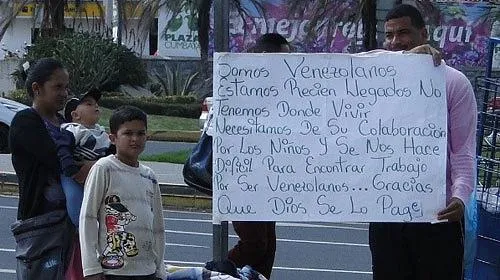CARE is appealing for $4 million to meet the immediate needs of those in need in Venezuela and its borders.
QUITO (August 22, 2018) — The humanitarian crisis in Venezuela and its neighboring countries continues to deteriorate dramatically as millions of Venezuelans continue to flee the country in search of safety and a better life.
“The recent political tensions between Venezuela and Colombia had a great impact on those who are trying to cross the borders to Colombia, Ecuador and Brazil and are trapped in dire conditions,” says Alexandra Moncada, CARE’s country director in Ecuador, where more than 500,000 Venezuelans have sought refuge.
In total, 2.3 million people have fled Venezuela, mainly to Colombia which hosts around 1 million people. The number of Venezuelans crossing the border between Colombia and Ecuador increased from 2,000 people to almost 5,000 a day since late July. Ecuador, following the increased influx, decreed a state of emergency in three provinces of Carchi, Pichincha and El Oro. The state of emergency allows public institutions to devote resources to address the needs of recently arrived people while international organizations are assisting with the provision of tents and supplies such as food, water and personal hygiene kits for children and women.
Since Saturday, August 18, according to a new measure of the Ecuadorian government, Venezuelans are required to have a passport to enter the country. This leaves hundreds of them stranded on the bridge of Rumichaca.
“The numbers of people in urgent need of humanitarian assistance is increasing very fast and we need to do whatever we can to meet their needs,” says Moncada. “Food, shelter and legal assistance as well as health services are among the most important gaps. In such dire living conditions, women and children are at high risk of violence and sexual exploitation.” “The lack of a regular migrant status results in Venezuelans, mainly youth, earning money ‘informally,’” she added. “This increases the risk of exploitation and their connection to illicit trafficking and illegal armed groups at the borders.”
Shelter, especially for women, has become a great concern as the number of families living on the streets continues to increase. Overcrowding, stress and lack of basic needs is causing tensions within the families and there are clear gaps around access to hygiene items that Venezuelans cannot afford, such as soap, feminine hygiene products and diapers.
To respond to the staggering needs, CARE Ecuador is appealing for $4 million to meet the immediate needs of 25,000 people in Ecuador and neighboring Colombia. CARE established the Venezuela Humanitarian Response Fund to respond to the crisis.
CARE, in partnership with local organizations, is providing food and nutrition services as well as critical health service referrals and psycho-social support. We aim to create safe spaces for affected groups, including women and girls who have survived violence and sexual abuse.
“One of the most critical gaps that we aim to cover is also the lack of legal or other important information provision. Since most people have access to mobile phones, CARE will provide protection information, specifically through the use of technology,” says Moncada.
CARE Ecuador will continue to monitor the situation closely and work to meet the needs of those affected as conditions are expected to deteriorate further in the coming months.
About CARE:
Founded in 1945 with the creation of the CARE Package, CARE is a leading humanitarian organization fighting global poverty. CARE has more than six decades of experience delivering emergency aid during times of crisis. Our emergency responses focus on the needs of the most vulnerable populations, particularly girls and women. Last year, CARE worked in 94 countries to reach 80 million people, including more than 11 million through emergency response and humanitarian aid. To learn more, visit www.care.org.
Media Contact
Nicole Harris, 404-735-0871, nharris@care.org

